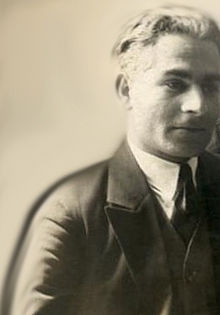Lado Gudiashvili
Vladimir (Lado) Gudiashvili ( Georgian ლადო გუდიაშვილი ; born March 18, 1896 in Tbilisi ; † July 20, 1980 ibid) was a Georgian painter.
Life
Youth and education
He was born the son of a railroad worker and began drawing a lot as a child. From 1910 to 1914 studied at the Tiflisser Kunsthochschule, then worked as an art teacher at a grammar school. Between 1914 and 1918 he was part of the Georgian circle of artists known as the Blue Horns , who combined symbolism with traditional elements. In 1915 he met the naive artist Niko Pirosmani , to whom he later dedicated various works. The first exhibition with 80 of his works opened in Tbilisi in May 1919.
Paris
In the same year he received a scholarship to the private Ronson Academy in Paris . At the Salon d'Automne in 1920 his works caused a sensation. He regularly visited the La Ruche artists' colony , where he met the painters Pablo Picasso , Amedeo Modigliani , Fernand Léger and Maurice Utrillo as well as the poets Louis Aragon and André Breton . This was followed by exhibitions in Bordeaux , Marseille and Lyon , and later in London , Rome , Brussels , Berlin , Amsterdam and New York . Galleries in France , Spain , the Netherlands and Italy acquired his paintings. Despite professional offers in France, he returned to Georgia in 1926 and taught at the Tbilisi Art School.
Style and themes
Gudiashvili was extremely versatile. He created oil paintings, frescoes and drawings, he worked with ink, water colors, gouaches or mixed his media. He illustrated books, created satirical drawings and sets. He painted historical pictures and portraits, allegorical compositions and decorative panel paintings, and dealt with mythological and political subjects. He switched from epic to lyrical leitmotifs, from tragedy to pamphlet. He glorified beauty and love, but did not shy away from portraying ugliness, the horrors of war, and violence.
In his early work he tended towards the dramatic grotesque and mystery ( Zozchali , 1920, Georgian Art Museum, Tbilisi). After 1926 he turned to the traditions of Caucasian and Persian art. He perceived the world more as theater. He liked to use allegories. In the picture Der Gang der Seraphita (1940) a gracious and beautiful woman is the focus. It represents the deity of the earth . In 1946 he designed frescoes for the altar apse of the Kaschweti Church in Tbilisi. For this he was expelled from the CPSU and dismissed from the Tbilisi Art School.
In an extensive anti-fascist cycle of ink drawings, Gudiashvili developed into a "Georgian Goya" . The drawings show ruins of art that are surrounded by half-animal, half-human monsters or naked goddesses symbolize the thought of the death of culture.
Awards
In 1972 he was awarded the title of People's Artist of the USSR , in 1976 he was named Hero of Socialist Labor . After his death he was buried on the Pantheon on Mtatsminda in Tbilisi . In Tbilisi, the street in front of the Georgian State Art Museum was named after him. The central central belt asteroid (2595) Gudiachvili was named after him.
literature
- Čiaureli / Sanikidzé (ed.): Lado Gudiashvili. Tbilisi, Georgian Information Agency, 1979.
- Moisei Kagan: Lado Gudiashvili . Leningrad, Aurora Art Publishers, 1984.
Web links
- Website Lado Gudiashvili (English, Georgian)
- Pictures by Lado Gudiashvili (text in Russian)
- Selected paintings by Lado Gudiaschwilis (English)
- Selected paintings by Lado Gudiashvili (Russian)
- Lado Gudiaschwili in the Internet Movie Database (English)
Individual evidence
- ^ Lutz D. Schmadel : Dictionary of Minor Planet Names . Fifth Revised and Enlarged Edition. Ed .: Lutz D. Schmadel. 5th edition. Springer Verlag , Berlin , Heidelberg 2003, ISBN 978-3-540-29925-7 , pp. 186 (English, 992 pp., Link.springer.com [ONLINE; accessed on August 24, 2019] Original title: Dictionary of Minor Planet Names . First edition: Springer Verlag, Berlin, Heidelberg 1992): “1979 KL. Discovered 1979 May 19 by RM West at La Silla. "
| personal data | |
|---|---|
| SURNAME | Gudiashvili, Lado |
| ALTERNATIVE NAMES | გუდიაშვილი, ლადო (Georgian); Gudiashvili, Vladimir |
| BRIEF DESCRIPTION | Georgian painter |
| DATE OF BIRTH | March 18, 1896 |
| PLACE OF BIRTH | Tbilisi , Russian Empire |
| DATE OF DEATH | July 20, 1980 |
| Place of death | Tbilisi , Georgian SSR |

